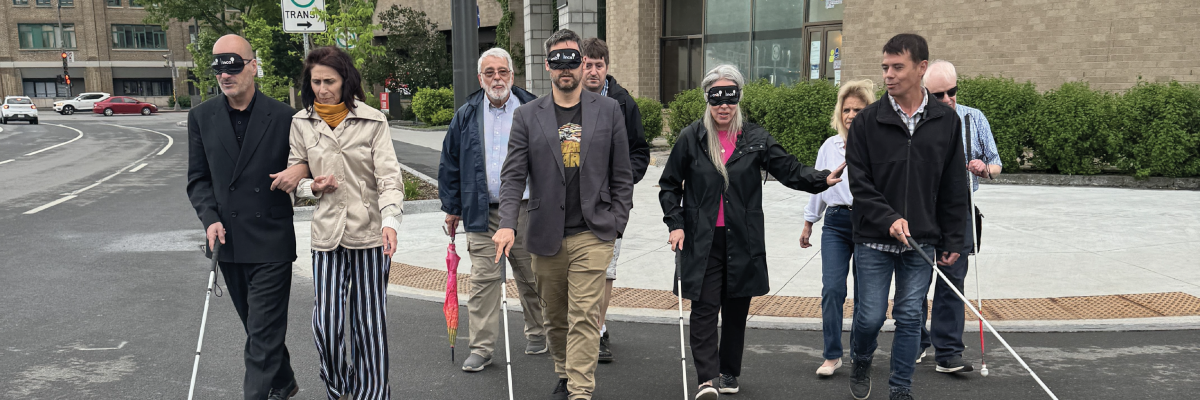By: Sarah Rouleau
In the fall of 2023, CNIB launched “Get on Board” – a new advocacy campaign that examines the barriers people with sight loss face while using publicly funded fixed-route transit systems in municipalities across Canada.
As part of the campaign, CNIB invited Québec City councillors to participate in an awareness activity to learn more about the challenges that floating bus stops and street crossings without audible pedestrian signals (APS) create for pedestrians who are blind or low vision.
The councillors in attendance included Maude Mercier-Larouche, member of the Executive Committee responsible for integrated mobility and public transportation, Pierre-Luc Lachance, Vice-Chair of the Executive Committee responsible for mobility and road safety; and Claude Lavoie, member of the Executive Committee responsible for universal accessibility.
David Trudel-Bergamo, a CNIB Peer-Support Program Lead and public transit user, showed the group how he uses a white cane to navigate.
We then challenged the councillors to navigate a street corner blindfolded. Through this awareness activity, the councillors very quickly realized how challenging it is to cross a bike path to reach a floating bus stop without an accessible infrastructure.
“You can’t feel much!” said Maude Mercier-Larouche as she approached the bike path, sweeping a white cane in front of her. Upon removing her blindfold, she discovered that she had walked into the middle of the path without realizing it, just as a cyclist was passing by on their bike.
CNIB’s research into floating bus stops found that a detectable separation between the sidewalk and the bike path, a tactile and contrasting crosswalk, a bus shelter on the platform with an accessible bus stop, a way of announcing the passage of cyclists would help improve the safety of floating bus stops.
The awareness activity was made possible thanks to the Regroupement des personnes handicapées visuelles de la région de Québec et de Chaudière-Appalaches Regional Association RPHV 03-12. The organization considers floating bus stops near bike paths, which are multiplying quickly, to be a major issue. The RPHV 03-12 has been the voice of our community in the region for decades, participating on a number of committees and tackling a range of issues, including transportation. It’s found that raising awareness among politicians and public transportation officials—and presenting them with CNIB’s research and recommendations on this pressing issue—complements their work on the ground,
Québec City and the RTC are serving as role models, meeting the challenge with a commitment to accessibility and the transit network’s online consultation platform, and we hope that others follow their lead!
